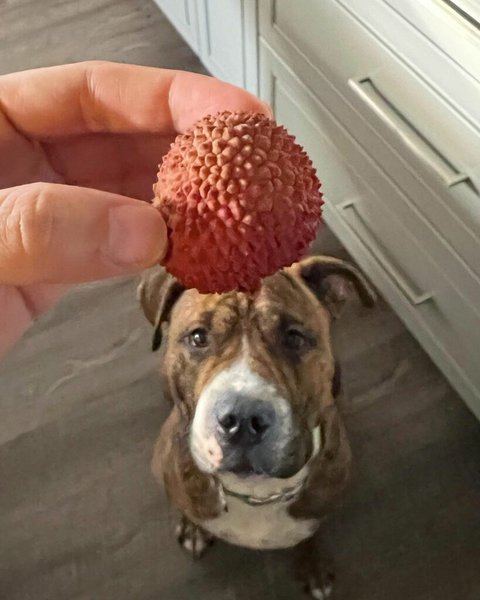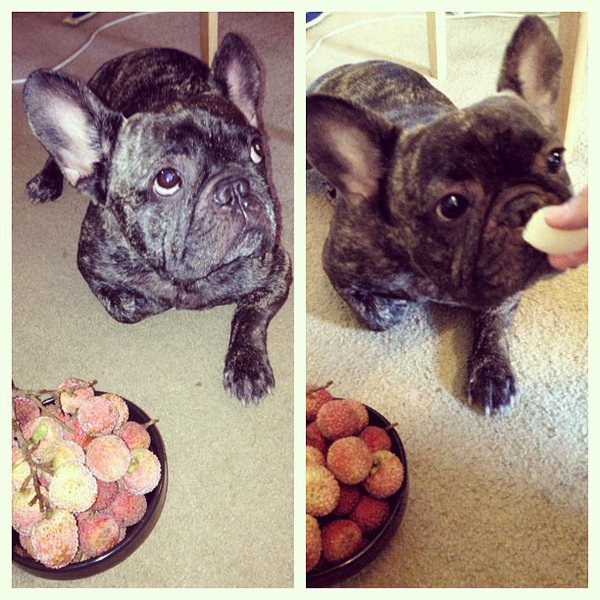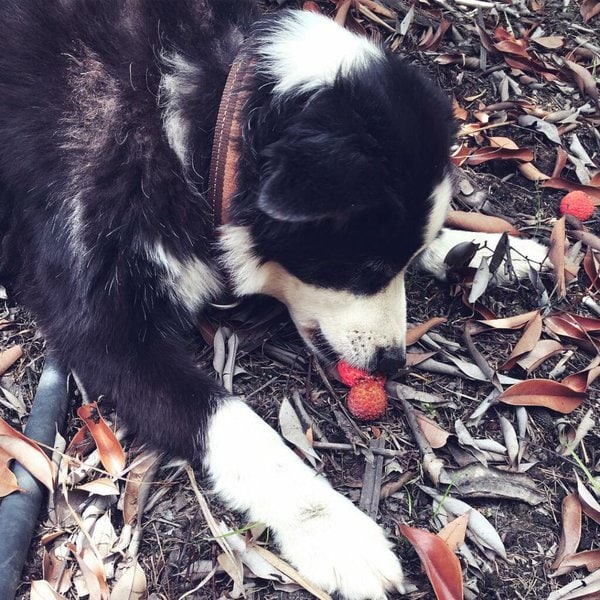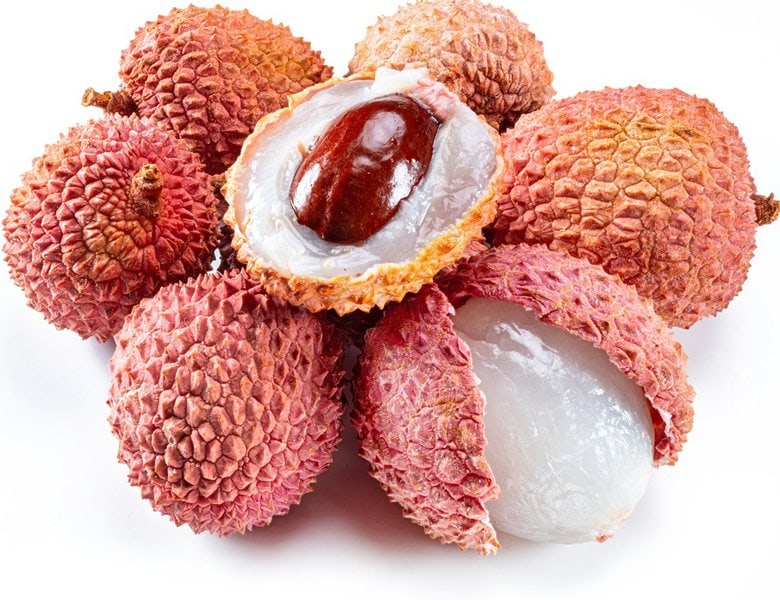If you wish to feed lychee to your dog, it is critical to know the benefits and risks involved. Lychee is a delicious fruit that is enticing to many canines. Nonetheless, you must understand how it could affect your four-legged furry friend.
Yes, dogs can eat lychee. This nutritious fruit is excellent to feed your dog once in a while. Lychee is full of fiber and nutrients. But you have to be cautious because of its high sugar content, which can lead to potential stomach upsets and other health conditions that can hurt your pooch.
Ripe lychee is one of the most delicious fruits in the world. Therefore, it is unsurprising that both human beings and dogs like it. But it is essential to research what foods will benefit your dog most. This article reviews how to prepare lychee safely, ideal serving sizes for dogs, and potential health risks to consider. But first, let’s address what to do if your dog eats lychee.
Are Lychees Poisonous To Dogs?

No, ripe lychees are not poisonous to dogs. But unripe lychees or lychee seeds are poisonous to dogs. If your dog ate an unripe lychee or its seeds, take them to a vet immediately.
Generally, the lychee fruit is safe for dogs unless they overeat or consume unripe lychee. There are many reasons for doggies to like lychees–they are not only attractive but also tasty.
What If My Dog Eats Lychee?
You don’t have any reason to worry if your dog eats lychee. This beautiful-looking fruit that tastes like grapes and pears is safe for pooches if they eat it in moderation. The high sugar content of lychees is why you must be careful to avoid stomach upset or other digestive issues.
Another thing you need to consider is the ripeness of the lychee. If your canine eats unripe lychee, then you need to be concerned. Unripe lychees are poisonous and can harm your pooch. Take your dog to see your vet as soon as possible.
Even if your pooch doesn’t immediately show signs of poisoning, take your dog for medical help immediately. Making assumptions is not something you should do as a dog owner. Your vet is in the best position to determine whether your canine is safe after consuming unripe lychee.
Some of the symptoms to watch out for if your dog eats unripe lychee follow:
Nutritional Value Of Lychee
Lychee is a tropical fruit from Sapindaceae or the soapberry family, and the flesh of ripe lychee is especially tasty. However, lychee is also an excellent source of fiber. Since it is low in calories, lychee is a safe treat for overweight pooches. Additionally, lychee is a natural diuretic, so give this to your pooch if they struggle to urinate.
Dieticians have confirmed that lychee is full of vitamins, contributing meaningfully to the health of your four-legged furry friend. The protein content is another reason it is considered a highly nutritious fruit for dogs.
Lychee is a healthy snack. Dogs not only enjoy lychee but also derive health benefits from eating this delicious fruit.
But do not feed lychee to your pup as part of their regular diet. Daily consumption of lychee will be counterproductive. It can affect the digestive system of your pooch due to the inability of dogs to process fruit as effectively as humans.
Can Dogs Eat Lychee Seeds?

No, dogs can’t eat lychee seeds. Lychee seeds are not safe for humans or dogs. Therefore, you should not allow your pooch to eat them.
What Happens If A Dog Eats A Lychee Seed?
You have a good reason for concern if your dog eats a lychee seed, which contains a substance known as saponin. Saponin can adversely affect the health of both dogs and people.
The lychee plant naturally produces saponin to protect itself from insects. This same substance is used to manufacture detergents and soaps.
What do you think will happen to your pooch after eating a substance used for making soap? The result can’t be good. However, saponin does not have the same level of toxicity when the source is not lychee. Yet, saponin from lychee is dangerous enough to affect your canine’s digestive system.
So, lychee is nutritious and safe for dogs if they consume only some parts of the plant. If your dog consumes the seed of this plant, you need to act urgently. Consult your vet immediately. You might have to take your pooch to the hospital for a proper checkup to avoid future problems.
Are Lychee Nuts Toxic?
Yes, lychee nuts are toxic to dogs and humans. You may assume lychee nuts are nuts from lychee fruit. But “lychee nut” is another name for lychee seeds. As previously explained, lychee nuts or lychee seeds are toxic to dogs. Don’t allow your dog to eat unripe lychee or lychee seeds.
How can you identify a ripe lychee nut? It is reddish-brown in color. Unripe lychee nuts are toxic, so take your dog to a vet immediately if they eat lychee nuts or seeds.
Lychee nuts are toxic to humans too. It was reported in 2014 that some children died from a brain disease caused by eating unripe lychee nuts. If unripe lychee nuts killed human beings, what do you think they can do to your dog? It is better not to find out.
The amino acid component in unripe lychees negatively impacts blood glucose levels and lowers them to dangerously low levels, rendering these fruits toxic. Also, the seeds of lychee nuts are rough, making them indigestible for both dogs and humans.
Eating lychee nuts can cause intestinal blockages, which explains the reason they can affect the digestive system of your pooch. Remember that these seeds also contain saponin. So, it is best that your canine does not touch the seeds of this fruit.
Can Dogs Eat Lychee Safely?
Raspberries, cucumbers, and bananas are safer options than lychee for dogs. Yet, your pooch can eat lychee safely if you serve them ripe lychee without seeds.
Only Ripe Lychees
Only offer ripe lychee to your dog, as they can benefit from its nutritional value and delicious taste.
Monitor canines if you have lychee in the kitchen, especially if they have eaten the fruit before and enjoy the sweet taste. Like children, you need to watch out for your four-legged furry friend, especially what they eat. They eat almost anything if you let them.
Dogs that have tasted ripe lychee fruits are more likely to eat unripe ones. They cannot differentiate between ripe and unripe fruit. Ensuring that your canine only eats ripe lychee is your responsibility as an owner. Unripe lychee may harm your pooch.
Moderate Amounts

The fact that ripe lychee is safe for dogs does not mean that you should allow your pooch to consume it excessively. Though lychee contains natural sugar, your canine can still have digestive issues or stomach upset if they eat too much lychee. Pooches cannot process large quantities of sugar.
Only allow your dog to eat lychee in small quantities once in a while. Indeed, lychee is a healthy snack, but as a treat, not as part of regular meals. Despite their nutritional value, these fruits do not have all the nutrients your dog needs daily. So, there is no point in letting your pooch consume lychee daily.
Start with small quantities, especially for dogs eating this fruit for the first time. This approach will enable you to detect how your dog reacts.
Remove Outer Skin
Another safety measure you should consider when giving lychee to your dog is removing the outer skin of the fruit. What your dog needs are the flesh of this fruit and not its seeds.
Dogs are generally impatient when it comes to food. If you do not help your pooch to remove the outer skin of this fruit, your canine will eat it whole. The fruit skin contains unhealthy substances that can lead to stomach upset or any other digestive issue. Your dog does not have the ability to digest the outer skin of this fruit.
Is Lychee OK For Dogs?
The long-term health implication of any food, fruit, or snack should be important to every dog owner. Lychee is safe but can affect your pooch in the long run when consumed excessively.
Health Risks Of Lychee For Dogs
Unripe lychee, the outer skin, or the seed can cause various health issues for dogs. They include stomach upset, weight gain, toxicity, and a choking hazard.
Stomach Upsets
Even when your dog does not react to the seed or outer skin of lychee immediately, you can still see the impact later. Stomach upsets are one of the common health issues pooches have when they consume any other parts of this plant than its flesh. You will also notice the same problem when your canine consumes lychee nuts.
If you notice your dog wriggling in pain or barking strangely, take your dog to a vet immediately. Do this as soon as possible, especially if you suspect that your dog consumed unripe lychee or seeds.
Weight Gain
Obesity is a health challenge for many dogs today. A sedentary lifestyle is one risk factor. However, it can also be due to unhealthy feeding habits. For example, if your dog consumes lychee fruits excessively, it can lead to unhealthy weight gain.
How is this possible? The digestive system of dogs is not as powerful as that of humans. When your pooch has excessive sugar to process, it will be stored as fat in the body. When this accumulates, it can lead to obesity. Obese dogs have weaker immune systems, leading to a higher probability of succumbing to illnesses.
Toxicity

Signs of toxicity in dogs include the following:
- Extreme salivation
- Nausea
- Dry heaving
- Diarrhea
- Loss of appetite
Your pooch may show these symptoms after eating unripe lychee or lychee seeds or nuts. If you don’t act quickly, it can lead to more complications, such as internal bleeding, vomiting, and weakness.
Do not wait until it is too late. If your dog eats lychee nuts or unripe lychee or shows the above symptoms, take your dog to a vet immediately.
Choking Hazard
Even if eating the flesh of lychee plants, your dog can choke. To avoid this, chop the flesh into smaller pieces. This approach will ensure that your dog eats this fruit without any problems.
As a caring dog owner, you will have to make sacrifices to take good care of your pooch. One of the ways you can do this is to help your canine process and digest foods. This process will help to prevent choking, making it a lot easier for your canine to digest the treat.





